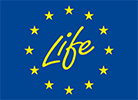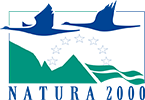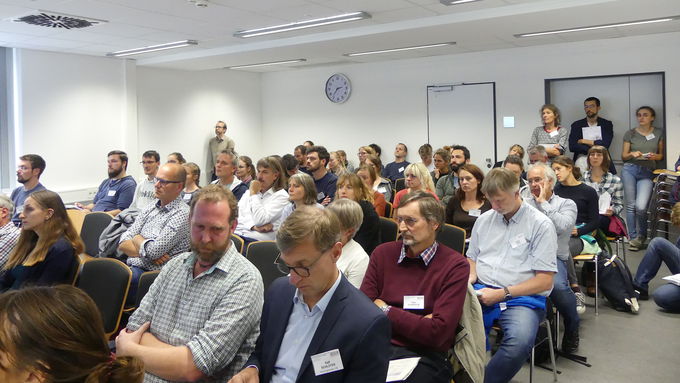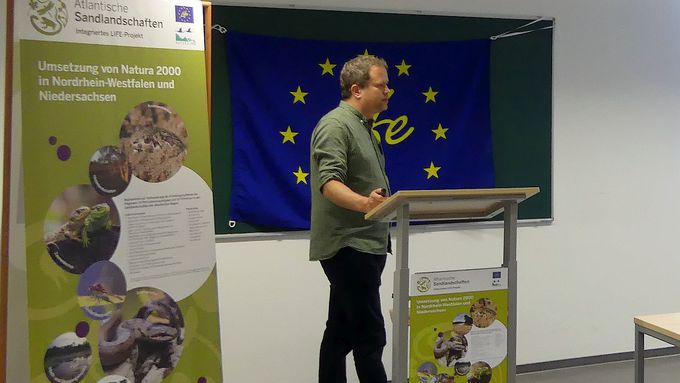Die Session des IP-LIFE war trotz der vielen gleichzeitig laufenden Sitzungen gut besucht. © Bezirksregierung Münster
download picturemain content
Project of the month
#09/2019 EXPERT CONFERENCE IN MÜNSTER
Session of the LIFE IP during the annual meeting of the Ecological Society of Germany, Austria and Switzerland
Besides information exchange with other (LIFE) projects and organizing project conferences to involve all stakeholders, the participation and hosting of expert meetings and conferences is an important component of any LIFE project. In the first phase of the LIFE IP ‘Atlantic Region DE’, the focus was on the exchange with other national and international projects. Team members presented the project or individual aspects to different specialist audiences. The two project conferences so far organized by the LIFE IP – on the one hand the official kick-off conference in April 2017 and on the other hand the award ceremony as ‘Project of the United Nations Decade on Biodiversity’ in February 2019 – served the information exchange and integration of all project participants and partners.
Due to the fortunate circumstance that the Institute for Landscape Ecology of the University of Münster organized the 49th annual meeting of the Ecological Society of Germany, Austria and Switzerland (GfÖ) in Münster in 2019 under the motto ‘Science meets practice’, the LIFE IP had the opportunity to participate in a high-profile scientific conference right on its doorstep. Even more so, as this year's annual meeting explicitly was supposed to encourage exchange between the academic ecological community and practitioners. In 40 thematic sessions, with 385 lectures and 198 posters as well as additional workshops and panel discussions, a good overview of the current state of ecological research and practical application in nature conservation was provided. The ‘Practitioners' Day’ on 10th September, in particular, addressed to all those involved in practical nature conservation and, in contrast to the rest of the conference, was conducted in German.
The LIFE IP Atlantic Region DE organized a session that day entitled ‘Implementation of NATURA 2000 in practice: Protecting the species and habitats of the Habitats Directive in the European Union through the funding instrument LIFE Nature’. Federal and state level officials reported in a wider context on current developments as well as opportunities and challenges in the implementation of Natura 2000. Team members of selected LIFE projects presented some examples from their practice. A particular focus, of course, was laid on the LIFE IP as the first integrated LIFE project in Germany within the priority area ‘Nature and Biodiversity’. Conceptual, bureaucratic and practice-related aspects were highlighted as well as problems in the implementation of the projects according to a best practice analysis. Sebastian Schmidt and Martina Raffel of the District Government of Münster moderated the two lecture blocks.
- At the beginning, project manager Sebastian Schmidt presented the Integrated LIFE Project Atlantic Region DE and gave an overview of the project goals and structures as well as selected implementation measures.
- Christina Müller from the Federal Agency for Nature Conservation explained the current challenges in the implementation of Natura 2000 in Germany. The new results of the report on the Habitats Directive 2019 show that no fundamental improvement of the conservation status of the protected goods took place since the 2013 report and thus the 2020 targets of the EU Biodiversity Strategy cannot be achieved. The current data, however, allow for an analysis of individual parameters and trends. Lack of funds and resources as well as the need for action, with strong overlaps with other ministries are, however, a major challenge.
- Ruth Brauner, formerly member of the European Commission's monitoring team which is responsible for the LIFE IP and since March 2019 entrusted with setting up a new nationwide LIFE information centre in Bonn presented the LIFE Program and its contribution to the implementation of the Natura 2000 network in Germany. More than 130 projects have been or are being implemented in Germany within the LIFE priority area ‘Nature and Biodiversity’. The presentation gave a brief overview of the objectives and possibilities of the EU LIFE funding program and the diversity of LIFE Nature projects in Germany in particular.
- Ralf Schlüter, head of the department ‘Biotope Protection and Contractual Nature Conservation’ at the State Agency for Nature, Environment and Consumer Protection in North Rhine-Westphalia (LANUV), explained the cross-national concept of the LIFE IP for the implementation of Natura 2000. Methods are being developed to advance the concretization of thresholds and the prioritization of protected goods at the level of the Atlantic biogeographical region. During the concept development, concrete priority measures are to be derived, the implementation of which ensures the most visible success of the LIFE IP. In this way, practice and concept interlink directly in the later course of the project.
- Ines Bruchmann from the Lower Saxony Water Management, Coastal Defence and Nature Conservation Agency (NLWKN) in Hanover presented at the end of the first lecture block how the priorities for the conservation measures in Lower Saxony are determined. In order to act as goal-oriented and efficient as possible in the sense of the overall project goals, all known occurrences of the target habitat types were identified, categorized by nature conservation criteria from a country-wide perspective and prioritized for the project's concerns. In addition to the effective steering of the project resources, this prioritization forms an important basis in the communication with the stakeholders.
- The second lecture block in the late afternoon was opened by Birgit Beckers, chair of the umbrella organization of biological stations in North Rhine-Westphalia and managing director of the biological station Soest. She explained the role of biological stations in the implementation of Natura 2000 and LIFE in North Rhine-Westphalia. Around 40 biological stations work as non-profit recognized associations almost in the entire federal state. Of the meanwhile 33 LIFE projects in NRW, for 22 they have been the responsible body. Currently, 16 biological stations are involved in the implementation of the Integrated LIFE project Atlantic Region DE.
- Peter Schwartze, technical director of the Biological Station Kreis Steinfurt, gave an overview of the measures taken in the first phase of LIFE IP in the district of Steinfurt. Optimization measures for oligotrophic to mesotrophic standing waters with vegetation of the Littorelletea uniflorae and/or of the Isoeto-Nanojunceteaes (LRT 3130) were implemented at three heath ponds as well as in wetlands. These measures also help to improve the conservation status of the moor frog (Rana arvalis) and the floating water-plantain (Luronium natans) and also will have a positive impact on other endangered species.
- The presentation by Christian Göcking from the NABU Nature Conservation Station Münsterland focused on the common spadefoot (Pelobates fuscus). Conservation measures for this amphibian species which is extremely rare in north-western Germany were implemented from 2012 to 2016 in the LIFE project ‘Protection of the common spadefoot in parts of the Münsterland’ with numerous cooperation partners. Since 2017, the conservation breeding and setting-up of mirror populations have been continued in the LIFE IP Atlantic Region DE and expanded spatially. Current results of the monitoring prove the successful reproduction of the species in different areas.
- Another project on amphibians within the LIFE program was presented by Christian Höppner from NABU Lower Saxony. LIFE BOVAR is dedicated to the management of the yellow-bellied toad (Bombina variegata) and other endangered amphibian species, such as the midwife toad (Alytes obstetricans), the natterjack toad (Epidalea calamita) and the crested newt (Triturus cristatus). The most important goals of the project are the implementation of practical species conservation measures for the restoration of favourable habitat conditions, the strengthening of the biotope network through stepping stones and reintroduction. In addition, genetic basics for the establishment of a breeding population of the midwife toad for restocking and reintroduction will be developed.
- Last but not least, Holger Rößling from the Stiftung NaturSchutzFonds Brandenburg gave insight into his experiences from ten years of LIFE implementation. With the projects LIFE Kalkmoore (2010-2015), LIFE Sandrasen (2013-2019), LIFE Wetlands (2014-2022) and LIFE Trockenrasen (2019-2026), more than 20 million Euros will be invested in the conservation of Natura 2000 in Brandenburg. In his lecture, he focused in particular on practical experiences from the implementation of measures, strategies for cooperation with land users and regional actors, and cooperation with scientific institutions.





